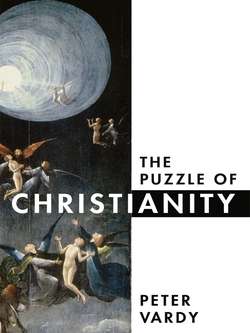The Puzzle of Christianity

Реклама. ООО «ЛитРес», ИНН: 7719571260.
Оглавление
Peter Vardy. The Puzzle of Christianity
Copyright
Dedication
ONE. United and Divided
TWO. From the Beginning of the Universe
THREE. The Life of Jesus
FOUR. The Message of Jesus
FIVE. The Resurrection and the Initial Spread of Christianity
SIX. The Development of the Early Church
Marcionism
Gnosticism
Arianism
Nestorianism
Pelagianism
SEVEN. Unity, Growth, Division and Discord
EIGHT. Reformation and Counter-Reformation
John Wycliffe (c. 1324–84)
Jan Hus (c. 1371–1415)
Martin Luther (1483–1546)
John Calvin (1509–64)
The Counter-Reformation
The Church of England and the Episcopalian churches
Summary
NINE. The Rise of the Protestant Churches
TEN. The Bible
ELEVEN. The Philosophy of Religion
1. Does God exist?
Cosmological arguments
Ontological arguments
The Design Argument
2. What is the nature of God?
3. How can evil be explained?
The Augustinian approach
John Hick’s Irenean theodicy
4. What happens after death?
5. How can Jesus be both fully human and fully divine?
TWELVE. Christian Ethics
Theoretical bases for Christian ethics
Biblical ethics
The Natural Law approach to ethics
Situation Ethics
Orthodox ethics
Conscience
Christian ethics today
A commitment to the idea of absolute Truth
A commitment to justice in terms of relationships, family, society and the international dimension
Love of one’s neighbour
A commitment to social justice
Sexual fidelity in marriage
Compassion and forgiveness
Rejection of greed
Rejection of jealousy
Rejection of anger
THIRTEEN. Spirituality and Mysticism
St John Climacus (c. AD 525–606)
St Benedict (c. AD 480–547)
Hildegard of Bingen (1098–1179)
St Francis of Assisi (1181–1226)
Julian of Norwich (1342–1416)
St Ignatius of Loyola (1491–1556)
St John of the Cross (1542–91)
St Teresa of Avila (1515–82)
Evelyn Underhill (1875–1941)
Marian spirituality
Mysticism in a broader context
FOURTEEN. Outward Expressions of Inner Realities
Advent
Christmas
Epiphany
Lent
Easter
Ascension
Pentecost
Symbols
Crosses
FIFTEEN. Christianity Today
Social justice
The preferential option for the poor
Business ethics
Feminism
The challenge of the new atheism
Worship and practice
SIXTEEN. Conclusion
Postscript
List of illustrations. Chapter 1
Chapter 2
Chapter 3
Chapter 4
Chapter 5
Chapter 6
Chapter 7
Chapter 8
Chapter 9
Chapter 10
Chapter 11
Chapter 13
Chapter 14
Chapter 15
Index
About the Book
About the Author
About the Publisher
Отрывок из книги
To Christine Smith
Who, first at HarperCollins and then at SCM,
.....
In these years it was felt that only God could be the Lord and Master of Israel. Religiously, therefore, the idea of having a king was treated with scepticism. However, political and military expediency made the choosing of a king necessary. Three great kings unified and, in the case of two of them, extended the national borders: first Saul, then David (the greatest king of all, who was also a musician and a poet and who ruled over the kingdom of Israel at the time of its broadest extent) and finally Solomon. It was during David’s reign, many modern biblical scholars argue, that the story of Abraham was written down. The boundaries of David’s kingdom coincide closely with the land promised by God to Abraham, but it was only for a very short period that Israel actually controlled these territories.
David was at one time held to be the author of many of the psalms which have been recited or sung in Christian churches down the centuries. One of the most significant directly attributed to David was Psalm 23:
.....